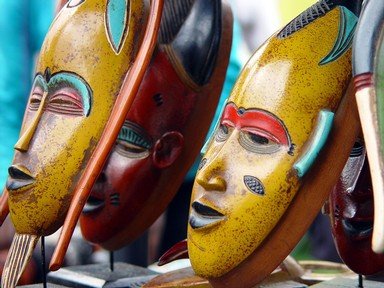Quiz Answer Key and Fun Facts
1. Mealtimes are an important part of Mauritanian culture, but there are some unusual customs as to with whom they will eat their food. Of the following, who would you NOT expect to see sitting at your Mauritanian dinner table?
2. After both lunch and dinner it is customary in Mauritanian homes for women, children and slaves to serve the men with which beverage?
3. Custom dictates that on major ceremonial occasions an animal is slaughtered. Which section of society are the only ones who are permitted to slaughter an animal?
4. Mauritanian society is organised within a strict 'caste' system. Of the following, which would you be surprised to find in the lowest social class?
5. Mauritania, as a tribal society, has many marriage customs and marriage between cousins is commonplace. "It is expected that any married couple must divorce if they are found to have shared milk from the same breast". Is that statement true or false?
6. Back to eating... In Mauritania food and the eating of food has an important social aspect. What implements do Mauritanians use exclusively in handling their food whilst eating?
7. One of the oldest social customs in Mauritania is the practice of 'Leblouh'. What is 'Leblouh'?
8. "In Mauritania the contribution made to society by women, of any ethnicity, is not recognised in any form". Is that statement true or false?
9. Before taking a photograph of a Mauritanian male, it is customary to do which of the following?
10. Unusually for a one hundred percent Muslim nation, many Mauritanians still adhere to the use of what in their religious rites?
Source: Author
SisterSeagull
This quiz was reviewed by FunTrivia editor
stedman before going online.
Any errors found in FunTrivia content are routinely corrected through our feedback system.
